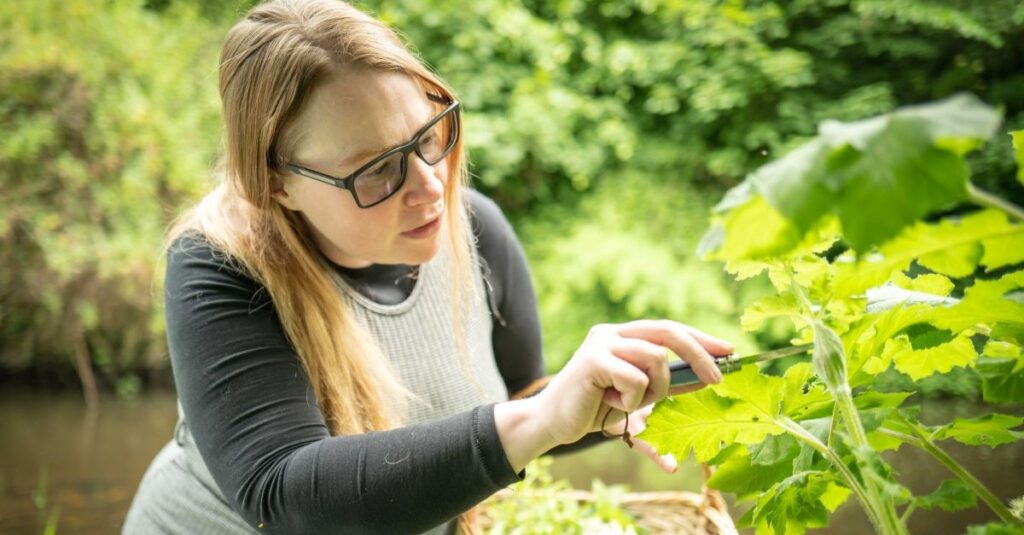
In a nutshell, Forager Amy Rankine: ‘I eat seasonal wild foods when I am at home, but I can’t stand onions’
Amy Rankine is a forager based in central Scotland and has been delivering walks and workshops for eight years. In 2023 she took part in the Wildbiome Project, eating only wild food for three months as part of a study on its impact on the gut microbiome.
What’s the closest thing you have to a signature dish:
I love building a meal around a seasonal quiche. In the spring, hogweed, sow thistle and willowherb shoots, garnished with peppery honesty flowers; in the autumn with ceps, chanterelles and saffron milkcaps; plenty of pickles on the side and generous wedge of sourdough.
Describe your style of cuisine in ten words:
Rustic and a bit wild.
Best and/or most memorable meal you’ve ever eaten:
There is no meal like the community dinners at an association of foragers meet-up – think wild spiced curries, chocolate covered caramel mushrooms, acorn cakes and fly agaric chow buns. The combination of creativity and camaraderie is what makes it so very special.
Worst/weirdest thing you’ve ever eaten:
Squirrel kebabs? Guinea pig? Sea anemone? None of these things are either weird or bad, but certainly culturally situated, and it is only by us sitting outside of its cultural base that makes the idea strange.
Worst thing you’ve ever cooked:
Chicken of the woods and dandelion root flatbread. This did not work out.
What’s the dish that you’re most proud of having cooked:
Egg-fried sea spaghetti. Whilst on the wild microbiome diet, figuring out how to make a completely wild version of egg fried rice, using sea spaghetti ‘rice’, blueberries, wild mushrooms as well as green vegetables like hogweed and nettle.
Favourite ingredient:
Hogweed salt.
Your go-to recipe book:
Ferment Everything by (the other) Andy Hamilton
What other country’s cuisine really excites and intrigues you?
Japan. I use a lot of inspiration particularly around fermentation.
Most you’ve ever paid for a meal:
£120 as a rare treat. I don’t have a lot of disposable income, so generally if I eat out it is a much more modest sum.
Your favourite Scottish chef:
Rupert Waites (Buck and Birch).
Favourite chef outside Scotland:
Craig Worrall.
Who taught you to cook or ignited your passion for food as a youngster:
My Aunt Ruby, who was also my cooking teacher at high school.
Most important lesson a young chef can learn:
Adaptability/flexibility in the kitchen.
What do you eat when you’re at home:
Seasonal wild foods, a lot of game and fish, ferments, all in generally too large quantities.
Celebrity guest or your perfect dinner party – who would you most like to cook for:
I’ve once accidentally fed Prue Leith.
Tell me a something about you that virtually no-one knows:
I can’t stand onions. People know this, but there seems to always be some selective forgetting when I come over for dinner…
What’s your favourite wine?
A Gose, which is a salted sour beer, and would pair wonderfully with a fish dish or cut through a sweet dish. I think we don’t use beer enough in a culinary sense, and there are great breweries in Scotland which we should be singing about.
Your spirit of choice?
Gin – I particularly like Colonsay gin who forage all their botanicals by hand on the island.
Do you play music in the kitchen and, if so, what’s your go-to track or artist:
I’m more of a podcast, where I can let my mind wander as I work.
Amy Rankine will educate attendees on wild produce and how vegetables, fruits and herbs can be utilised and fermented in the ‘kitchen’ at this year’s Game & Wildlife Conservation Trust Scottish Game Fair event which takes place from 5 – 7 July at Perthshire’s Scone Palace.
Read more Chefs In a Nutshell here.
Subscribe to read the latest issue of Scottish Field.
TAGS

